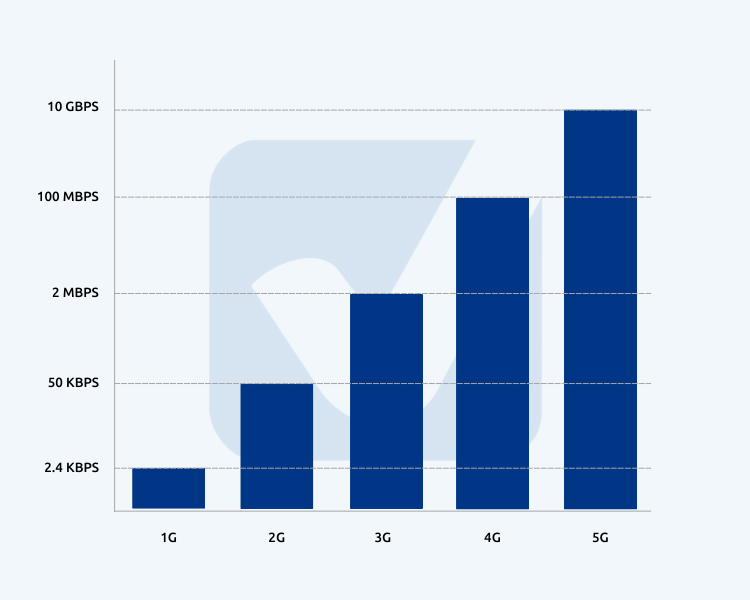5G Network: Airtel, Jio, Vi, BSNL Plans

The fifth generation of cellular networks is here! Known as 5G, it is up to 100 times faster than 4G. The emergence of 5G networks promises to revolutionize the way we interact with technology, offering unprecedented speed, connectivity, and innovation. In this article, we'll delve into the world of 5G networks, focusing on the plans and strategies of major players like Airtel, Jio, Vi, and BSNL in India.
What is 5G Network?
- Definition: 5G, the fifth-generation wireless technology, offers faster data speeds, lower latency, and increased connectivity compared to its predecessors. It promises to revolutionize mobile communication and enable new applications such as augmented reality, IoT, and autonomous vehicles.
- Key Features: Ultra-fast speeds, low latency, higher capacity, and massive device connectivity.
- Use Cases: Enables applications such as augmented reality (AR), virtual reality (VR), Internet of Things (IoT), and autonomous vehicles.
How 5G Can Outrank 4G? An Evolution That Leads to 5G Speeds

| . | Deployment | Technology | Latency | Multiplexing | Core Network |
|---|---|---|---|---|---|
| 1G | 1980s | Analog Voice | N/A | FDMA | PSTN |
| 2G | Early 1990s | Digital Voice | 629 ms | TDMA, CDMA | PSTN |
| 3G | Early 2000s | Mobile Data with CDMA, IP Technology | 212 ms | CDMA | Packet N/W |
| 4G | 2010s | 4G LTE, Wearable Devices | 60.98 ms | CDMA | Internet |
| 5G | Early 2018s | Higher Speeds, Superior Reliability, Wearable Devices with AI capabilities | <1ms | CDMA | Internet |
5G is designed to meet the needs of the future, including the internet of things (IoT) and autonomous vehicles. It comes with faster speeds, lower latency and less congestion across multiple industries. It is a new kind of network that can connect virtually everyone and everything – from machines and objects to devices.
In April 2019, South Korea was the first nation to adopt 5G on a large scale; followed by 88 other nations with 224 operators.
The top 5 reasons why 5G is way better than 4G are:
5G Network | 4G Network |
|---|---|
| Expected low latency is under 5 ms. | Promising download speed to tenfold. |
| 5G will support 1Millon per km square. | 4G offers CDMA |
| 5G uses small cell technology, which means that it will offer more capacity to support more connected devices and users. | 4G transmits signals from cell towers. 4G could not meet goals it set. |
| 5G will support 1Millon per km square. | Supports 4000 devices per km square |
India: An Early Adopter of 5G
The next generation of cellular technology (5G) takes connectivity to the next level. This technology leverages cloud technologies to provide businesses with a faster, more reliable network.
At its core are new radio signals that use wavelengths ranging from 30 to 300 GHz. These signals use millimeter waves (mmW) to send data, allowing direct connections to be made between towers, homes, and other areas. That is why it is called millimeter technology. [source: IEEE]
Delhi, Varanasi, Mumbai, and Bangalore are the cities in which Airtel has launched the 5G services and by March 2024, every Indian home will get the service as said by Airtel CEO Sunil Mittal.
With very high frequency signals,5G is capable of creating new lanes having incredible data bandwidth.
How does 5G works?
The three basic variations that compile 5G are:
- Low Band: Low-band 5G frequencies are below 2 GHz and operate over long distances – up to approximately 20 miles. Low-band 5G services are expected to be used by rural areas, remote islands, and buildings that can't get 4G coverage. These speeds could eventually enable small businesses to go global without relying on high-speed internet providers.
- Mid-Band:5G is a mid-band spectrum that will serve as an Internet backbone for the age of the mobile internet. It is characterized by high speeds and low latency, providing a capacity layer for cities. The frequency band rates are in the hundreds of Mbps. And it's less impacted by buildings.
- High Band:5G uses higher frequencies than the current LTE standards. The frequency ranges from 24 GHz to 100 GHz, wherein, giving download speeds of 2GB per second. Because high frequencies cannot easily move through obstacles, mmWave 5G is short range by nature. Further, mmWave coverage requires more cellular infrastructure.
5G Network in India
- Telecom giants like Airtel, BSNL, Nokia, Samsung and Huawei conducted success trails in 2018
- To accelerate the fiberization and bring an insured investment in optical fiber technology, government of India formulated policies in April 2018.
- 5G- enabled mobile phones hit the market by April 2019
- Commencement of 5G spectrum auction by August 2019
- 5G trails for consumers, expected to go live by mid-2020
- 5G, launched in selected cities of India by 2022
“Apple Inc will start upgrading its iPhone models: iPhone 14, 13, 12, and iPhone SE to be compatible with 5G networks in India in December.”
5G Frequency Bands Used By Telecom
The different frequency bands available in India with telecom providers are 3300 MHz, 2500 MHz, 2100 MHz, 1800 MHz, 900 MHz, 800 MHz ,700 MHz and 26 GHz.
Service Provider | Frequency Band | Total Spectrum |
|---|---|---|
| Jio 5G Bands | 700MHz band, 800 MHz, 1800 MHz, 3300 MHz and 26 GHz | 24,740 MHz |
| Vi 5G Bands | 1800 MHz, 2100 MHz, 2500 MHz, 3300 MHz and 26 GHz bands | 19,876 MHz |
| Airtel 5G Bands | 900 MHz, 1800 MHz, 2100 MHz, 3300 MHz and 26 GHz bands | 6,228 MHz |
Jio 5G Network and Plans
After the 5G services were launched on October 1, 2022, The Jio 5G network rollout began in 4 cities: Delhi, Kolkata, Chennai, and Mumbai. The initial rollout will be a pilot testing of 5G, and it is expected to take Upto 3 months to get started with other cities. Jio has adopted the standalone architecture to service cities for 5G.
- End-to-End Solution: Jio aims to provide a comprehensive 5G solution, including network infrastructure and devices.
- Focus on Affordability: Prioritizing affordability to make 5G accessible to a wide range of consumers.
- Innovative Offerings: Introducing innovative services and applications to leverage the capabilities of 5G technology.
Jio's 5G Upgrade Plan
Your pack is currently active. It includes a total of 6 GB of data, with all 6 GB available at high speed. Please note that unlimited 5G data is only applicable in cities where Jio True5G has been launched, and you've been invited for the Jio Welcome Offer. This offer is applicable on Plans Rs119, Rs149, Rs179, Rs199, and Rs209.
| Jio Prepaid Recharge Plan Price | Data Benefit | Validity |
|---|---|---|
| Rs 98 | 1.5GB | 14 Days |
| Rs 127 | 12GB | 15 Days |
| Rs 129 | 2GB | 28 Days |
| Rs 149 | 1GB/ Day | 24 Days |
| Rs 199 | 1.5GB/ Day | 28 Days |
| Rs 249 | 2GB/ Day | 28 Days |
| Rs 329 | 6GB | 84 Days |
| Rs 349 | 3GB/ Day | 28 Days |
| Rs 399 | 1.5GB/ Day | 56 Days |
| Rs 444 | 2GB/ Day | 56 Days |
Airtel 5G Network and Plans
Bharti Airtel anticipates extending its 5G service to 7,000 cities and almost 100,000 villages across India by March 2024.All the Airtel users who have 5G-enabled mobile devices would be able to use the services on their existing data plans.
Airtel's users can check if 5G network is available for them through the Airtel Thanks App. Users will also receive a notification for if their smartphone device is compatible with 5G.
- Investments: Airtel has committed significant investments in infrastructure to roll out 5G services.
- Partnerships: Collaborating with equipment manufacturers and technology providers to accelerate 5G deployment.
- Use of Spectrum: Acquiring spectrum licenses to ensure optimal coverage and capacity for 5G networks.
| Plan Name | Validity | Data |
|---|---|---|
| Airtel Rs 239 Plan | 24 days | Unlimited 5G, 1GB/day 4G |
| Airtel Rs 265 Plan | 28 days | 1GB/day 4G |
| Airtel Rs 295 Plan | 30 days | 25GB total, Unlimited 5G |
| Airtel Rs 299 Plan | 28 days | Unlimited 5G, 1.5GB/day 4G |
| Airtel Rs 319 Plan | - | Unlimited 5G |
| Airtel Rs 359 Plan | 1 month | Unlimited 5G, 2GB/day 4G |
| Airtel Rs 399 Plan | 28 days | 2.5GB/day 4G |
| Airtel Rs 455 Plan | 84 days | Unlimited 5G, 6GB 4G |
| Airtel Rs 479 Plan | 56 days | 1.5GB/day 4G, Unlimited 5G |
| Airtel Rs 499 Plan | 28 days | Unlimited 5G, 3GB/day 4G, Disney+ Hotstar Mobile for 3 months |
It is offering:
- Upto 30x faster downloads: You can download an HD movie within seconds.
- 4K Videos: You can now enjoy high quality videos without buffering.
- Virtual World: You can enjoy new gaming experience: AR/VR
Vi 5G Network and Plans
Vi would be using 2 bands of the frequency range: 3300MHz (n78) and 26GHz (n258).The company is planning to get started with 3300 MHz (a mid-band frequency) in 17 locations namely: Madhya Pradesh, Maharashtra, Kolkata, Karnataka, Kerala, Uttar Pradesh (East), Uttar Pradesh (West), Bihar, Delhi, Gujarat, West Bengal and Andhra Pradesh. For 26GHz, the plan is to roll out in 17 cities, which are still to be decided.
Vi intends to introduce 5G services within the next 6-7 months by July-August this year and anticipates gaining more clarity on 5G monetization by that time. Additionally, the telecommunications company plans to deactivate its 3G network in FY25 and repurpose airwaves in the 2100 MHz band for 4G services.
BSNL 5G Network and Plans
As per reports from the Indian press, the Managing Director of the telecom company, Gopal Vittal, stated during an earnings call: "We plan to commence the launch of 5G in August and aim for a nationwide rollout shortly thereafter. By March 2024, we anticipate achieving coverage in every town and significant rural areas with 5G. In fact, comprehensive network rollout plans for 5000 towns in India are already finalized. This rollout will be one of our largest in history."
- Government Support: BSNL receives support from the Indian government to develop and deploy 5G networks.
- Rural Connectivity: Prioritizing rural connectivity to bridge the digital divide and promote inclusive growth.
- Collaborative Efforts: Collaborating with industry stakeholders to overcome challenges and accelerate 5G adoption.
The Promise of 5G Technology
The promise of 5G technology lies in its ability to deliver significantly faster speeds, lower latency, and increased connectivity compared to previous generations. This enables transformative applications such as augmented reality, IoT, and autonomous vehicles, revolutionizing communication and enhancing user experiences.
Faster Speeds and Reduced Latency
- Enhanced User Experience: 5G promises to deliver faster download and upload speeds, enabling seamless streaming, gaming, and browsing experiences.
- Low Latency: Reduced latency ensures near-instantaneous response times, critical for applications such as online gaming and real-time communication.
Enhanced Connectivity and IoT Integration
- IoT Revolution: 5G technology facilitates the widespread adoption of IoT devices and applications across industries.
- Smart Cities: Enables the development of smart cities with interconnected infrastructure, improving efficiency and sustainability.
- Industrial Automation: Supports the deployment of Industry 4.0 technologies, enhancing productivity and operational efficiency.
5 G Challenges and Considerations
- Investment Requirements: Building 5G infrastructure requires significant investments in towers, antennas, and backhaul networks.
- Regulatory Hurdles: Regulatory approvals and spectrum allocation processes can delay the rollout of 5G networks.
- Cybersecurity Risks: 5G networks introduce new cybersecurity challenges, such as increased attack surfaces and vulnerabilities.
- Data Privacy: Concerns regarding the collection and use of personal data in 5G-enabled applications and services.
Looking Ahead: Future Prospects of 5G in India
As India gears up for the widespread adoption of 5G technology, the future looks promising. With major players like Airtel, Jio, Vi, and BSNL leading the charge, the stage is set for a transformative shift in how we connect, communicate, and innovate in the digital age.
5G Network: Frequently Asked Questions
What are the benefits of 5G?
5G benefits:
- Faster downloads
- Low network latency
- Flexibility with network slicing
- IoT with high density of smart devices.
What are the disadvantages of 5G?
5G disadvantages are:
- Connectivity could be impacted by the obstructions
- Initial costs for rollout are high
- It has limitations of rural access
- There is a difference between the upload and download speeds.
What are the requirements to get Airtel 5G Plus?
There are few things to be taken care of if you are moving to 5G network:
• Go to the settings tab
• Get to Connections or Mobile Network.
• Select the 5G network mode.
- Your sim should be 5G ready. Currently, all Airtel 4G sims are 5G enabled.
- Your smartphone should be 5G compatible. If yours is not; just upgrade to one that is compatible to enjoy the high speeds of internet.
- You would require to change the handset settings.
